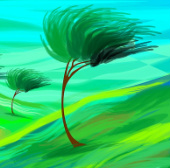
Philosophy
Here are some of the fundamental concepts which have emerged from over two decades of teaching around the globe. They all add up to an overarching holistic teaching style and philosophy which I do my best to share with all of my students.
— Keri Chryst
Founder
Jazz Vocal Academy Int'l
Give someone a fish, they'll eat for a day - teach 'em how to fish, they'll eat forever
This is a cornerstone of my personal beliefs. If a student manages to do something more or less "correctly" but has no idea how or why or what got them there, then the chances are less than average that they will be successful at reproducing that skill on a consistent basis - and they probably wont get very far.
It is more important to me that my students succeed outside the classroom than in. For that, I help them to develop a set of tools, skills, and "tricks" which allow them to be autonomous and make progress even (or especially!) when in the field.
Knowing not only WHAT works, but WHY & HOW it works, so that maybe they can even share the knowledge and skill with others someday ☺
9 times out of 10, the carrot will get you farther than the stick
I come from the "positive reinforcement" school of educational philosophy. This was how my most effective mentors treated me, and I have seen the most improvement in myself, as in my students, when this attitude is applied.
With each student, I always start by amplifying something that they do well, and use it as a building block for making improvements where needed elsewhere.
I steer clear of any language that implies aggression or force, or notions of "black and white", "right" or "wrong". I prefer terms such as "more efficient", "more beneficial for the long term", etc. I see the learning process as a continuum wherein there is ALWAYS an element of something "right" even when improvements can be made.
If you're looking to be "beat-up" and "disciplined" and "forced" into taking actions that are supposedly "for your own good"... then perhaps it's better to look elsewhere.
Your agenda is most important - my only 'agenda' is to help you fulfill your own in the most efficient way for both long and short term.
Each student is deliciously different. Fortunately for us teachers, many of their strengths and weaknesses fall into similar categories. I have personally spent the past decade developing sets of tools and tips and tricks to help reinforce said strengths and overcome any weaknesses... but as I said, I have no "agenda". I will adapt my pedagogy to your own personal goals and aspirations, with an eye on "teaching you how to fish" (see above ;-) ).
Educational Philosophy
"Flexibility = Stability"
"Efficiency is Beauty"
"Maximum result from Minimal effort”
The human body is an amazing machine which we have also managed to exploit as a musical instrument over the course of the millenia.
It is a complex interconnected system of flexible flesh and muscle tying together more solid bones, working as pumps and levers to keep the rest of the system functioning, moving, eating, etc.
I work with my students for them to harness their body's natural springs, bungee chords, anchors, pumps, suspension bridges, echo chambers, etc. so that they can get the maximum result from minimal effort.
Time and again, my students and I experience together that magic moment when all of the body's elements are naturally aligned, and a most amazing sound effortlessly emerges as if from "out of nowhere".
Our body already knows everything we need it to…
The average 2 year old has spent the majority of his/her life to date exploring every possible sound his or her body can produce. He/she then spends the successive years sifting through those sounds, keeping only those which are useful to him/her for interfacing with society around them, and discarding or forgetting the rest.
Experience shows however that that early knowledge is far from lost ! It's merely buried somewhere in the unconscious or semi-conscious where it's been lying unused for years on end. I therefor work with my students to help them rediscover how to connect with this unconscious knowledge and experience to uncover a capacity for producing sounds that even they didn't know they were capable of.
...we've simply forgotten to LET it do it !!!
Experience has also shown that the parts of the brain that control our finer motor function (including those that govern vocal production) are happening on a predominantly unconscious level.
Part of what I teach my students is how to establish the appropriate balance of communication between their conscious thought, and their unconscious motor control; Thus helping them to "get out of their own way" and let their body (i.e. unconscious mind) do what it knows how to do better/best!





